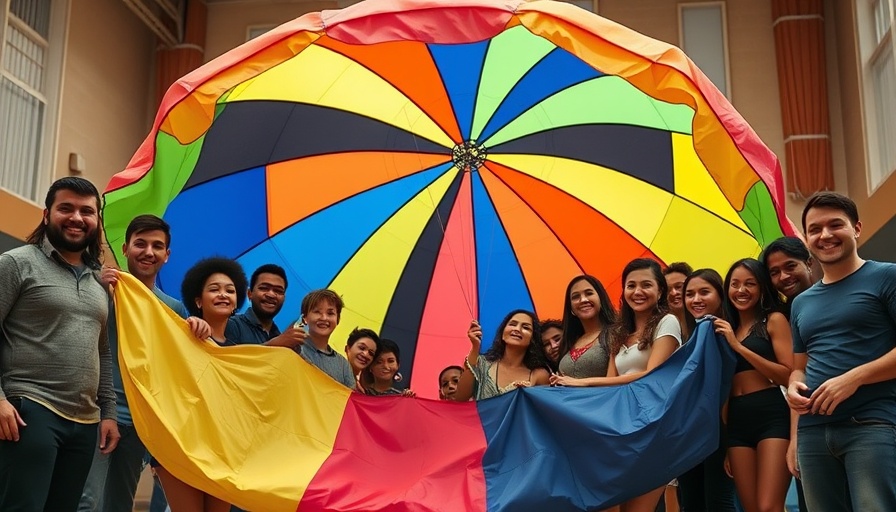
Embracing Inclusion: Why Disability Games Matter in PE
In an exciting step towards an inclusive future, the introduction of disability games into the Physical Education (PE) curriculum has become a beacon of hope for many aspiring educators and students alike. As part of their training, new student PE teachers at Brighton University recently participated in a workshop dedicated to teaching adaptive games designed for students who are either visually impaired or have mobility challenges. This initiative underscores the importance of equity and inclusion within the framework of education, particularly in fostering a nurturing environment for all students.
Breaking Down Barriers with Adaptive Sports
During their training session, the cohort learned how games such as boccia, sit-down volleyball, new age kurling, goalball, and parachute games could be adapted to meet the needs of all participants. Dr. Gary Stidder, the PGCE PE Route Leader, passionately voiced that these games should firmly hold their place on the secondary school PE curriculum. By doing so, schools can ensure not only a breadth of experiences but also a depth of understanding about inclusivity in sports. Through hands-on activities, student teachers were able to gain firsthand experience on how to adapt traditional games to accommodate varying abilities, which equips them to be better educators.
Historical Context and the Evolution of Disability Sports
To truly appreciate the significance of including disability games in schools, it is important to explore their history and evolution. Disability sports have come a long way from being sidelined to becoming a pivotal part of community events and athletics. The rise of events like the Paralympic Games embodies the spirit of inclusion and equality, showing that athletes with disabilities can perform at high levels. As these adaptive sports gain recognition, it becomes increasingly crucial for educational institutions to embrace progressive programs that reflect this societal shift.
Enhancing Educational Outcomes Through Inclusion
Implementing disability games not only aligns with ethical educational practices but also enriches the learning experience for all students. When students engage with their peers through inclusive practices, they develop critical skills such as empathy, teamwork, and respect for diversity. Such experiences not only positively influence social dynamics within schools, creating a culture of acceptance and support but also enhance mental well-being. After all, physical activity in a supportive environment is essential for maintaining a healthy lifestyle, which resonates deeply with the trending health and wellness movements.
Why Health-Conscious Adults Should Take Note
As adults who value healthy living, understanding the implications of inclusive sports in youth education is vital. The incorporation of disability games in schools encourages an active lifestyle that does not discriminate based on physical ability, aligning seamlessly with the principles of sustainable self-care and anti-inflammatory nutrition. For health-conscious adults, supporting these initiatives not only aids in fostering healthier communities but also empowers future generations to engage fully in physical activities, irrespective of their abilities.
Real-Life Impact and Community Connections
Emily Brooks, a local community advocate, emphasizes the importance of initiatives like these within our neighborhoods. One inspiring example from the local scene is a community sports day where parents, teachers, and students come together to both learn and play adaptive games. These events break down social barriers and amplify community bonds, illustrating that when we support inclusivity in education, we benefit the entire fabric of society. Aside from enriching students’ lives, this initiative could potentially lead to increased participation in community sports programs that further strengthen the local health landscape.
Advocating for Change: How You Can Help
As members of the adult community, advocating for the inclusion of disability sports in school programs is a collective responsibility. You can contribute by engaging in discussions with educational leaders, participating in community awareness events, or even volunteering your time to assist in adaptive sports programs. By doing so, you can help foster an environment where every child is empowered to express themselves, strengthen their bodies, and appreciate the diverseness of human abilities.
Conclusion: A Call to Action for Community Members
The rise of disability games within the PE curriculum offers an extraordinary opportunity for personal growth and societal advancement. Let’s champion these initiatives together—advocate for inclusive practices, support local efforts, and inspire others to consider the value of a diverse and vibrant community. Together, we can help our educational systems mirror the values of acceptance and equality that we hold dear.
 Add Row
Add Row  Add
Add 


Write A Comment